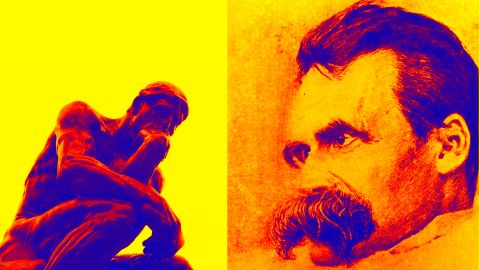The psychology of Nietzsche and how to use it yourself

While we have talked about Nietzschean philosophy before, Nietzsche also considered himself a first-rate psychologist, going so far as to claim in Ecce Homo, “That a psychologist without equal speaks from my writings – this is perhaps the first insight gained by a good reader.” He then goes on the claim that he is the first philosopher to engage in real psychology.
He may have been on to something, as it is often possible to read his philosophy as psychology and many of his philosophical concepts can be applied as psychological concepts. While psychologists have generally not credited him beyond the occasional reference, his ideas foreshadow some of the most revolutionary ideas in the history of the science.
Here, we present some of the psychological insights Nietzsche gave us.
Nietzsche begins his psychology with what was a radical notion; the idea that you cannot hope to know all about your mind all of the time. While the idea of a person having subconscious ideas, feelings, drives, and repressed memories is not shocking to us, the idea that man, “the rational animal” might not be able to understand how the mind worked at all times would have shocked the thinkers who first read Nietzsche.
He also understood that outside influences could have major effects on the of psyches of individuals. He explains in Human All Too Human that “Direct self-observation is not nearly sufficient for us to know ourselves: we need history, for the past flows on within us in a hundred waves.” Hinting that he understands that our deeper selves are influenced by many more factors than meets the eye. He lists among those factors culture and history, alongside our upbringings and a multitude of drives.
That we still have animal drives is a fact we often try to suppress. But one that Nietzsche saw as a mere fact and one to be dealt with. Dubbed “The Beast Within” by Zarathustra, these drives towards sex and aggression were being suppressed by an archaic morality which saw them as wicked. Nietzsche saw this repression as causing potential energy to go to waste. He argued that it was much better to understand that we have these primal drives and that’s alright, so long as they can be subdued and harnessed.

Are you driving your desires, or are your desires driving you? (Getty Images)
But, what should they be harnessed for?
In a world, self-overcoming. Nietzsche was all about personal growth, and his psychology reflects this. Nietzsche viewed the mind as a collection of drives. These drives were often in direct opposition to one another. It is the responsibility of the individual to organize these drives to support a single goal.
Even then, however, Nietzsche views this selection as one drive being stronger than any other one and does not see us as independent of the drives that we are composed of. To organize yourself is really to overcome all of your other drives, which are also parts of the self.
The exact nature of Nietzsche’s ideas is, again, hard to determine as he was less than systematic and often made nearly contradictory statements. He does praise the man who can build himself up, saying that his favorite proto-Ubermensch Goethe, “disciplined himself to wholeness, he created himself.” in Twilight of the Idols.
However, he also said that “At the bottom of us, really “deep down,” there is, of course, something unteachable, some granite of spiritual fatum of predetermined decision and answer to predetermined selected questions. Whenever a cardinal problem is at stake, there speaks an unchangeable ‘this is I.’”’ in Beyond Good and Evil
It does seem possible to say that Nietzsche is taking a middle road, arguing that it is possible to create yourself within limits set by your nature, culture, and historical forces. How much real freedom this grants the typical person in choosing what they will become is debatable, especially since Nietzsche didn’t believe in free will like the rest of the existentialists.
His often referenced “Will to Power” also fits in with this goal of self-creation. Walter Kauffmann explains in his book Nietzsche, Philosopher, Psychologist, Antichristthat “The will to power is thus introduced as the will to overcome oneself. That this is no accident is certain. The will to power is not mentioned again until much later—and then at length—in the chapter “On Self-Overcoming.” After that, it is mentioned only once more in Zarathustra. The will to power is conceived of as the will to overcome oneself.”
A truly powerful individual will be able to harness their competing drives to help propel them to a singular goal, one which they choose for reasons which are their own; though they are influenced at some level by their innate nature. This conception of self-development has echoes in humanistic psychology.
How can I use this?
Ask yourself if you are in control of your desires. Can you ignore one temptation in order to advance towards a larger goal? If you can’t, Dr. Nietzsche would say that you have yet to overcome some of your desires and they are derailing your ability to become what you can be.
While Nietzsche was skeptical of the benefits of self-reflection for most people he did see it as a worthwhile undertaking for the rare few who lived up to his insanely high standards. If we can make the blasphemy of applying his ideas to everybody, it can be said that the starting point for personal growth is to try to know yourself, what drives you have, what potentials you have or lack, and which drives you would like to foster or subdue. While, for Nietzsche, there is a limit to the knowledge of the self we can find this way, it is a place to start.
Has modern psychology gone anywhere with his ideas?

Freud, going somewhere. (Getty Images)
When it comes to Freud, the jury is still out on how much Nietzsche influenced him. While Freud claimed to have never read Nietzsche, this seems unlikely given both Nietzsche’s popularity and the similarity of several of their ideas on the subconscious mind. The psychologist Ernest Jones, who knew Freud, wrote that Freud both praised Nietzsche and claimed to have never read him. It has also been suggested that Freud purposefully avoided reading Nietzsche to prevent accusations of plagiarism, others claim he did read Nietzsche and then lied about it.
Carl Jung, a student of Freud, was influenced by Nietzsche when he created his psychological system. However, he didn’t openly admit this. He did use some Nietzschean terminology in his work and once lectured on Thus Spoke Zarathustra.
The Will to Power was later used as a basis for the individual psychology of Alfred Adler. Nietzsche’s conception of self-becoming has carried on in spirit, if not in exact form, in the humanistic psychology of Carl Rogers.
While his position as a philosopher is well known, Nietzsche’s contributions to psychology are often ignored. His insights into how we are motivated, how deep our subconscious mind goes, and how we might become the people that we hope to be, are all of great use to the individual. While the fact that he went stark raving mad may throw a damper on where a sane person who follows all of his insights might end up, there can be no doubt that his ideas can shine a light into the darkness of the minds that he was among the first to seriously explore.





